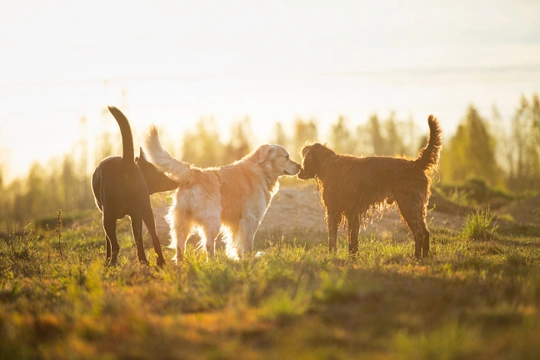
How a bitch in heat affects the behaviour of male dogs
If your own a male dog that is not neutered and suddenly find that they are acting out, trying to escape, displaying heightened sexual behaviours and generally behaving completely out of character and sometimes, uncontrollably, there might be a bitch in heat in the vicinity! Even if you are not aware of the presence of an unspayed bitch in season, your male dog certainly will be; they can scent the presence of a bitch in heat from a great distance away, sometimes over several miles in less built up areas.
Just like all animals, male dogs are affected and in some ways, dictated to by their hormones, and the pheromones given off by a bitch in heat, however distant she might be, will send your dog into a breeding frenzy. While there is a bitch in season within range of their sense of smell, you can reasonably expect your un-neutered male dog to have a one-track mind for the duration!
Read on to learn more about how the presence of a bitch in heat can affect un-neutered male dogs, plus behaviours to watch out for.
Escape!
When a male dog is being affected by the presence of a bitch in heat, pretty much everything else they know, and everything they have learnt, will go out of the window. Your dog will actively pursue or seek out the female, and this might include running off when unsupervised, refusing to return when called, and escaping from the home or garden to go off and find the bitch! Male dogs will go to great lengths to try to get to a female dog in season, and will have extra motivation to find them. They may jump fences, dig their way out of the garden, or chew through a tether or lead securing them in order to get on their way!
Scent marking
Your dog will also likely begin scent marking with a vengeance, around the garden, possibly the home, and when out on walks. The chances are, other un-neutered male dogs in the area will be doing the same, as they all partake in an unspoken battle for the territory containing the female dog.
Acting out
Your male dog’s behaviour may also change dramatically in other ways when they have breeding on their minds, and they will potentially begin to act out in a wide variety of ways. They may go off their food as they pine over their imagined love, and they might become incredibly annoying, barking, howling and whining to be let out constantly, so that they can go in search of the bitch! While this type of behaviour can be very annoying, not to mention disruptive, it will only continue for as long as the bitch in question is in season.
Lack of concentration
Un-neutered male dogs have a one-track mind when it comes to breeding, and they will find it very difficult to concentrate on anything else. This means that training and management of your dog may well become very difficult during this time, and you are highly unlikely to be able to teach your dog any new training commands or skills while their attention is elsewhere! Again, this should only continue for as long as there is a bitch in season in the locality, but as this can continue for up to around three weeks, it can prove very annoying!
Aggressive behaviour
Male dogs have a tendency to be defensive or aggressive with other un-neutered male dogs on occasion, and when they are competing over a bitch in heat, this is taken to a whole new level. Obviously, your own dog is not going to be the only entire male in the neighbourhood who is affected by the presence of a bitch in heat, and everything that your own dog is doing, any other dogs within scent range will be doing as well! Meetings of two un-neutered male dogs while the scent of a bitch in heat is in the air are likely to be aggressive, and male dogs will in some cases fight to the death over a bitch.
It is vitally important to be really careful with your dog while they are being affected by the presence of a bitch in season, both for their own protection and for that of other dogs.
Neutering
All of the issues mentioned above affect un-neutered male dogs only; neutered male dogs will not be at all phased by the scent of a bitch in heat, and will not display any out-of-character behaviours! Unless you are planning to use your male dog for breeding, getting them neutered is very wise, both to prevent all of the behaviours mentioned above, and for a wide range of health and temperamentreasons as well.



